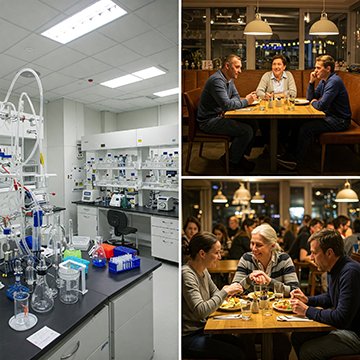Published: June 22, 2015 | Updated: September 18, 2025
Published: June 22, 2015 | Updated: September 18, 2025
The Evolving Landscape of Food: Moving Beyond Artificial Ingredients
Decoding the Drive for Cleaner Food Labels
 A significant shift is underway within the United States' food sector. Restaurants and food-packaging companies increasingly feel pressure regarding the ingredients they use. The rise of food blogs and a growing consumer preference for natural, healthy, and organic options have gained substantial traction. Diets emphasizing whole, unprocessed foods resonate deeply with a larger segment of the population. This heightened awareness and demand for simpler ingredient lists appear to represent a long-term change in consumer behavior, prompting the food industry to actively respond to these evolving needs. Let's decode the drive for cleaner food labels.
A significant shift is underway within the United States' food sector. Restaurants and food-packaging companies increasingly feel pressure regarding the ingredients they use. The rise of food blogs and a growing consumer preference for natural, healthy, and organic options have gained substantial traction. Diets emphasizing whole, unprocessed foods resonate deeply with a larger segment of the population. This heightened awareness and demand for simpler ingredient lists appear to represent a long-term change in consumer behavior, prompting the food industry to actively respond to these evolving needs. Let's decode the drive for cleaner food labels.
Understanding the Downsides of Artificial Ingredients
Artificial ingredients are synthetic substances added to food to enhance flavor, color, texture, or shelf life. While they often serve a specific purpose in food production, a growing body of research and consumer sentiment highlights several potential downsides associated with their consumption. Some artificial colors, for instance, have been linked to hyperactivity in children. Artificial sweeteners, often used as sugar substitutes, have been a subject of debate regarding their potential effects on metabolism and appetite regulation. Certain artificial preservatives, while effective in extending shelf life, have raised concerns about potential links to allergic reactions or other adverse health effects in sensitive individuals.
Potential Health Implications
The long-term health impacts of consuming various artificial ingredients remain under investigation. Some studies suggest potential links between certain additives and issues such as digestive problems, headaches, and even more serious health concerns. While regulatory bodies establish safety limits for these substances, who knows about the cumulative effect of consuming multiple artificial ingredients over an extended period? Consumers increasingly seek foods with simpler, recognizable ingredient lists, driven by a desire to minimize their intake of synthetic substances with uncertain long-term effects.
Impact on Taste and Nutritional Value
While artificial flavorings aim to mimic natural tastes, they often lack the complexity and nuance of their natural counterparts. Relying heavily on artificial flavors can also discourage the consumption of whole foods with inherent flavors.
Furthermore, the focus on artificial enhancers can sometimes detract from the nutritional value of food products. Instead of using whole, nutrient-rich ingredients, manufacturers may opt for cheaper artificial alternatives that offer little to no nutritional benefit. This shift can contribute to a diet that is calorie-dense but nutrient-poor.
Consumer Perception and Trust
The presence of numerous artificial ingredients can negatively impact consumer perception and trust in a brand. Many individuals view long lists of unfamiliar chemical-sounding ingredients with suspicion. They associate natural ingredients with healthier and higher-quality products. Companies that prioritize the removal of artificial ingredients often find that it enhances their brand image and resonates positively with health-conscious consumers, fostering greater trust and loyalty.
However, the move toward more health-conscious food production does present considerable challenges for those involved in food manufacturing. An initial thought might suggest that reducing the number of ingredients would lead to cost savings for companies. Yet, the reality is often quite different.
Consider the example of Papa John's commitment to reduce additives and eliminate MSG from certain menu items. This seemingly straightforward undertaking carries an estimated annual cost of $100 million, primarily directed at reformulating their dipping sauces. Extending such ingredient purges to meats and cheeses would undoubtedly inflate this expense dramatically.
Implementing such fundamental changes necessitates that food manufacturers develop entirely new recipes. These reformulations sometimes compromise the established taste profiles of their products, a critical factor in consumer acceptance. Furthermore, the removal of certain artificial preservatives can negatively impact a product's shelf life.
Shorter shelf lives can lead to increased food waste and potentially higher costs from suppliers for franchise owners. These new recipes invariably require adjustments to existing processing procedures and may even necessitate investments in new equipment, employee training programs, and updated operational protocols. All these factors contribute to a company's overall expenses and, ultimately, may translate to increased food prices for consumers.
Food safety emerges as another paramount consideration during recipe and process revisions. Ensuring the continued safety of the consumer remains a central concern. Additionally, companies must update trademarks for their reformulated recipes to safeguard brand integrity.
Even a seemingly minor alteration in the formula of a product supplied by a food manufacturer to a major restaurant chain, like McDonald's, triggers a cascade of necessary actions. These include comprehensive employee training across numerous locations, the creation of new documentation, updated training materials, and a host of other logistical and administrative requirements.
Many prominent restaurants and fast-food chains have publicly stated their intentions to reduce or eliminate artificial ingredients. Several have already made substantial progress in this area. Panera Bread, for instance, has published a "No No List" encompassing approximately 150 ingredients they are committed to removing from their offerings. Chipotle stands out as the first national restaurant chain to transition to using exclusively non-GMO ingredients in their food.
While consumer demand acts as the primary driving force behind this industry-wide movement, it is likely that the average consumer underestimates the significant effort and financial implications for food manufacturers in making this trend a reality. These increased costs will inevitably factor into the pricing of food products. Ultimately, consumers who prioritize healthier eating may view these price adjustments as simply the cost associated with that lifestyle choice.
Discover how streamlined maintenance processes can elevate production. Learn more.
Delving Deeper into Non-GMOs
The term "non-GMO" signifies that the ingredients in a product do not originate from genetically modified organisms. GMOs are plants or animals whose genetic material has undergone alteration using genetic engineering techniques. This modification often aims to introduce desirable traits, such as resistance to pests or herbicides, or to enhance nutritional content or yield. The non-GMO movement reflects concerns among some consumers about the potential long-term health and environmental impacts of consuming GMOs. These concerns often include worries about allergenicity, antibiotic resistance, and the effects on biodiversity.
For a product to be labeled "non-GMO," it typically undergoes verification processes to ensure that the ingredients used are not derived from genetically modified sources. Organizations like the Non-GMO Project provide independent verification and labeling for products that meet their stringent standards. This verification involves rigorous testing and traceability throughout the supply chain, from the farm to the finished product.
Choosing non-GMO ingredients often requires food manufacturers to establish new sourcing relationships with farmers and suppliers who adhere to non-GMO agricultural practices. This can involve more complex supply chains and potentially higher costs for non-GMO crops compared to their genetically modified counterparts.
The decision by a company like Chipotle to go entirely non-GMO represents a significant undertaking. It necessitates a complete overhaul of their sourcing strategy, ensuring that every ingredient, from corn and soybeans to oils and even animal feed for their meat suppliers, meets non-GMO criteria. This commitment reflects a strong response to consumer preferences and a willingness to navigate the complexities and potential cost implications associated with a non-GMO supply chain.
 The Role of CMMS in Non-GMO Decisions
The Role of CMMS in Non-GMO Decisions
A Computerized Maintenance Management System (CMMS) can play an important role in supporting a company's decisions and execution related to non-GMO initiatives. When food manufacturers transition to non-GMO ingredients, they often introduce new equipment or modify existing processes to handle these different materials. A CMMS helps manage the maintenance schedules and records for this new equipment, ensuring its efficient operation and minimizing downtime. This is particularly important when dealing with potentially shorter shelf lives of non-GMO products, where companies must have consistent production efficiency.
Furthermore, a CMMS can assist in tracking and documenting changes in processing procedures related to non-GMO production. This includes maintaining records of equipment cleaning protocols to prevent cross-contamination between GMO and non-GMO ingredients. This helps keep the integrity of non-GMO certifications. The system can also manage training records for employees who operate and maintain the new equipment or follow revised procedures specific to non-GMO production. By centralizing this information, a CMMS provides a clear audit trail, invaluable for demonstrating compliance with non-GMO standards and regulations.
Beyond maintenance, a CMMS can help manage inventory to track the usage of non-GMO ingredients and ensure adequate stock levels. This integration helps prevent production delays due to ingredient shortages and allows for better forecasting of non-GMO material needs. The data captured within a CMMS can also provide insights into the efficiency of non-GMO production lines, identifying areas for potential improvement and cost management.
In essence, a CMMS acts as a central platform for managing the physical assets and maintenance activities associated with a company's commitment to non-GMO products, contributing to operational efficiency and regulatory compliance.
Concluding Thoughts: A Culinary Evolution
The food industry stands at a fascinating crossroads. The increasing demand for transparency and simpler ingredients signals a fundamental shift in how food is produced and consumed. This evolution, driven by informed consumers and a greater emphasis on well-being, presents both challenges and opportunities. While the path toward cleaner food labels involves considerable effort and investment, it ultimately reflects a broader societal move toward prioritizing health and natural choices in our diets. This journey is not merely about removing certain ingredients; it represents a re-evaluation of our relationship with food and a commitment to a more wholesome culinary future.
FAQs
Why are consumers seeking cleaner food labels?
Consumers prefer natural, whole, and organic ingredients to reduce exposure to synthetic additives and potential health risks.
What are the downsides of artificial ingredients?
Artificial colors, sweeteners, and preservatives may affect health, reduce nutritional value, and alter taste.
How does switching to non-GMO ingredients affect food manufacturers?
It requires new sourcing, recipe reformulations, updated equipment, and potentially higher costs.
How can a CMMS like MAPCON support non-GMO initiatives?
MAPCON CMMS helps manage maintenance for new or modified equipment, track production processes, and maintain audit trails for compliance.
Why is inventory management important for non-GMO production?
Proper tracking ensures adequate non-GMO ingredient stock, prevents cross-contamination, and avoids production delays.
What overall benefit does using a CMMS bring to food manufacturing?
It centralizes maintenance, training, and process data, improving efficiency, regulatory compliance, and production reliability.
MAPCON | 800-922-4336
MAPCON CMMS software empowers you to plan and execute PM tasks flawlessly, thanks to its wealth of features and customizable options. Want to see it for yourself? Click the button below to get your FREE 30-day trial of MAPCON!
Try It FREE!